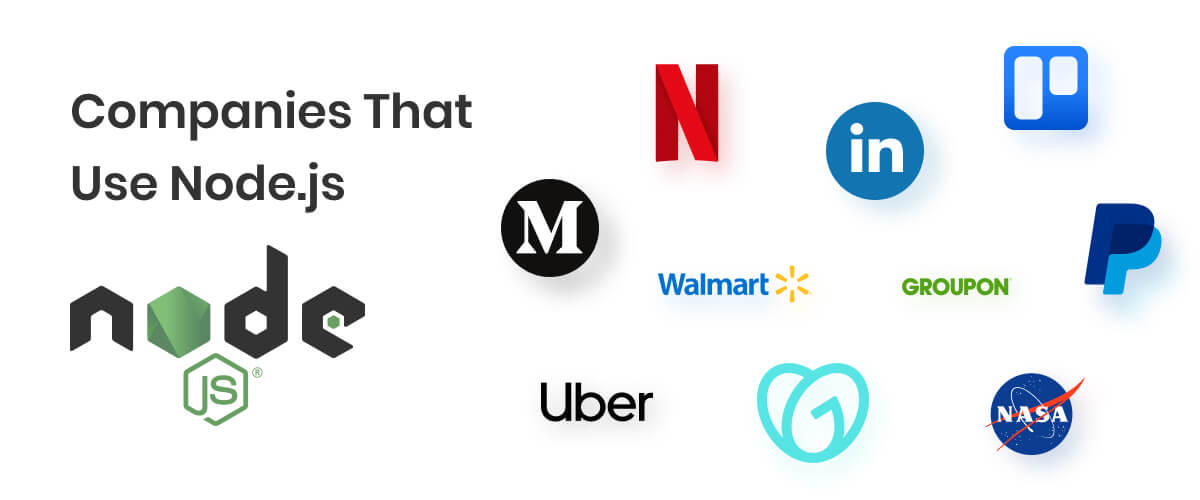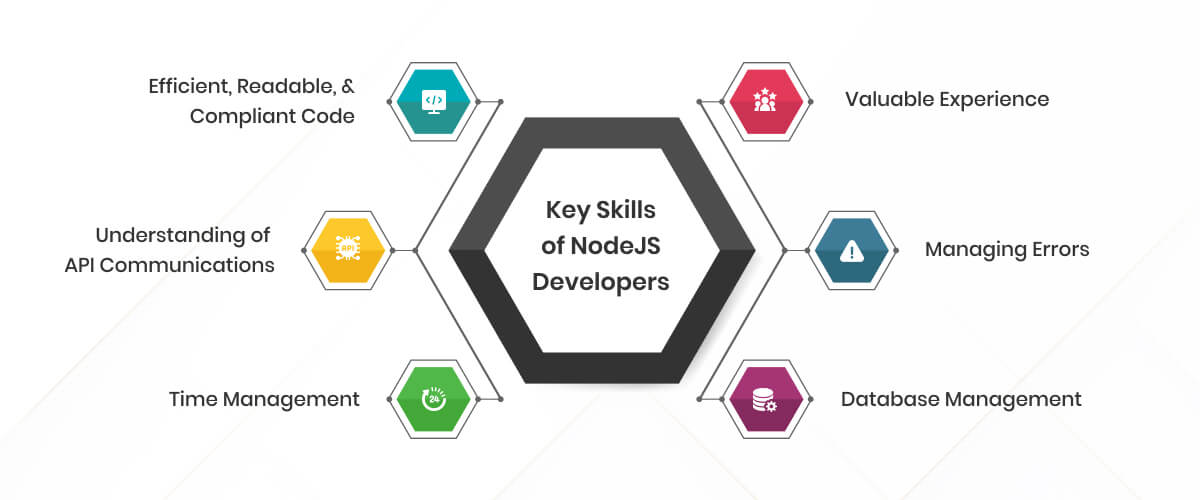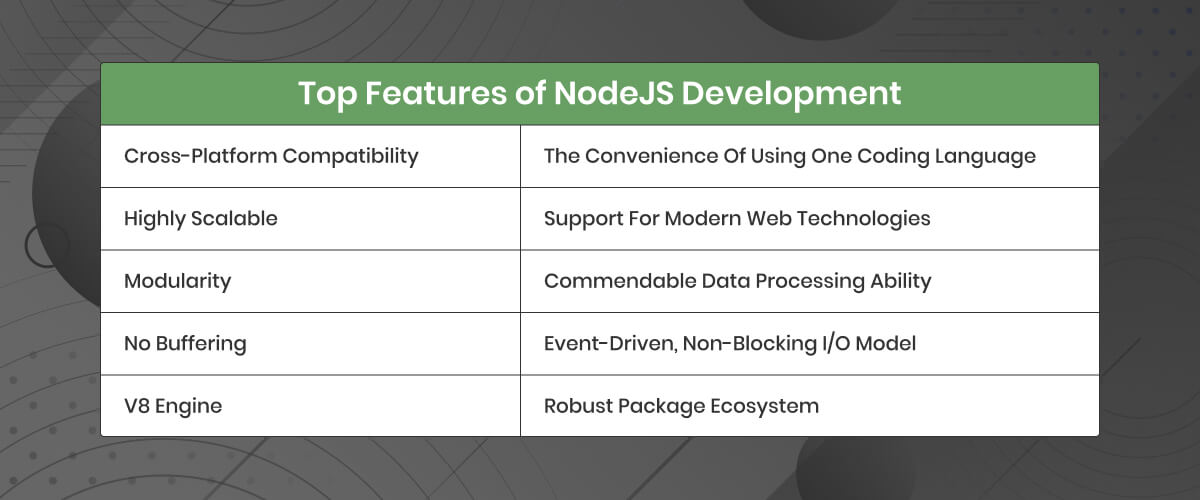Finding the best NodeJS developer for your project can be challenging. If you're looking for an experienced NodeJS developer but don't know where to start, read on to learn how to make the best decision for your project.
Synopsis
If you're looking for a new way to bring your company into the future, look no further than NodeJS. As the world of web development moves forward, many developers are looking for new ways to expand their skills and learn about new technologies. This is especially true if you're interested in learning about NodeJS.
NodeJS is one of the fastest-growing platforms on the market today. It's easy to learn, it's easy to use, and it allows developers to build applications with multiple threads using JavaScript as their primary language. This makes it ideal for building powerful applications that can handle large amounts of data quickly and efficiently.
It is a framework for quickly creating scalable network applications based on Chrome's JavaScript engine. It uses an event-driven, non-blocking I/O technique that is lightweight and efficient and is perfect for data-intensive real-time applications that use distributed devices.
Node.js has been running on VPS hosting since 2009 and is now one of the most popular server-side languages. It's used to build web applications and APIs which require real-time data transfer between client and server (like chat apps). However, it is not only about back-end development - it can also be used for front-end development with frameworks like ReactJS or AngularJS.
The demand for Node.js developers has been growing steadily over the past years, and this trend will continue in 2025 (according to Stack Overflow). It has become so popular that it is now one of the most sought-after skills for developers. The reason behind this is simple: Node.js is an ideal tool for web applications, especially those that are used frequently and need to be able to handle large loads.
What is NodeJS?
Node.js is a popular JavaScript runtime environment allowing developers to write JavaScript applications. It is used by various companies, large and small, to create websites, command-line tools, and microservices.
Ryan Dahl created Node.js in 2009 as a way for web developers to get around the limitations of traditional web programming languages like PHP and Ruby on Rails. In the past decade, it has become one of the most popular technologies for building server-side applications and microservices because it offers a fast runtime environment that's easy to set up and use.
Node.js had a 51.4% popularity rating among frameworks in the Stack Overflow 2020 poll. The figures somewhat decreased in 2021 to 33.91%, although technology remained in sixth place when it came to popularity rate.
Top Features of NodeJS Development
The first thing to know about NodeJS is that it’s not just a programming language; it’s an entire platform. This means that you get the full benefits of using NodeJS, including a robust package ecosystem, cross-platform compatibility, and more. Following are some of the most useful features of NodeJS.
1. Cross-Platform Compatibility
Node.js is a cross-platform runtime environment that enables you to build server-side and networking applications using JavaScript. Node.js uses an event-driven, non-blocking I/O model that makes it lightweight and efficient, perfect for data-intensive real-time applications running across distributed devices.
It's an open-source project with more than 1 million active users in over 200 countries worldwide, according to its website. The framework supports Linux/OS X and Windows operating systems, as well as ARM processors such as those found in mobile phones or tablets (iOS).
2. Highly Scalable
Node.js is a highly scalable platform and can be used to build high-performance websites and real-time applications.
Node.js is built on Google Chrome's V8 JavaScript engine, which compiles code into machine language and executes it at high speed. This makes Node.js very fast while consuming fewer system resources than other web development frameworks like Ruby on Rails or Django.
3. Modularity
Node.js is built on top of Google Chrome's V8 JavaScript engine, which is open source. This means you can look at the source code and make any changes you want!
Ryan Dahl created Node.js in 2009 as an experimental project to see if it was possible to build web applications using only JavaScript (and HTML). It has since grown into one of the most popular platforms for creating web servers and other backend services for web applications and mobile apps alike.
4. No Buffering
NodeJS is non-blocking, which means that it can handle multiple requests at the same time. NodeJS processes request asynchronously, meaning that it doesn't wait for a response from the server before processing another request. This makes NodeJS lightweight and fast compared to conventional frameworks such as Ruby on Rails or Django.
NodeJS was designed to develop real-time applications requiring near-instantaneous responses from users (such as chat apps).
5. V8 Engine
V8 is the JavaScript engine that is used in Google Chrome. It's written in C++, with a small part written in assembly language. This makes it much faster than other JavaScript engines, which compile JavaScript into bytecode or virtual machine code before executing it.
The V8 team has been working on making NodeJS more efficient and fast since its first release. They have also changed how V8 works internally over time to make things run even faster!
6. The Convenience Of Using One Coding Language
Node.js is a server-side JavaScript framework, meaning it's used to write web applications and services. Node.js allows developers to write code in one language instead of learning multiple languages for different platforms (e.g., Android, and iOS). This reduces the learning curve when developing for different platforms and makes it easier for developers familiar with JavaScript to pick up other programming languages.
7. Support For Modern Web Technologies
Based on the V8 JavaScript engine in Chrome, Node.js is a JavaScript runtime. It is fast and effective for real-time web applications because it employs an event-driven, non-blocking I/O design.
Node.js is a popular choice among developers due to its ability to handle thousands of connections at once, allowing you to create highly scalable network applications.
You can also use Node on Windows, MacOS, Linux, and even FreeBSD operating systems (though some features may vary). You can even run it on many different database systems like MySQL or PostgreSQL; there are also various frameworks available if you want to build your own application instead of using one of the existing ones such as ExpressJS or SailsJS.
8. Commendable Data Processing Ability
Node.js is a server-side JavaScript platform that can be used to develop web applications. It's an efficient and scalable runtime environment for building highly concurrent applications.
Developers can use this tool to create real-time web applications with high scalability, data streaming, real-time data processing, and other features that are not possible with other frameworks like PHP or Ruby on Rails.
9. Event-Driven, Non-Blocking I/O Model
NodeJS is event-driven and non-blocking. This means that the code is written so that it can respond to events rather than waiting for an operation like reading from the network or writing to disk to complete before proceeding. This is important for high-performing applications where each operation takes time. Still, there are many of them happening at once (think about all those websites you visit on your smartphone), as it allows NodeJS applications to run at full speed without having to wait for individual tasks.
10. Robust Package Ecosystem
Node.JS is one of the most popular and powerful platforms for building applications. It has a large number of packages, which developers use to create web applications and other software products.
A package contains reusable code that can be used in multiple projects, making it easier for developers to build better software faster without reinventing the wheel whenever they start something new.
Advantages of Using NodeJS
NodeJS is used to build web applications and websites using the same programming language developers use in their browsers: JavaScript. This makes it easy for developers to create fast, scalable network applications in NodeJS. The technology has been gaining popularity for web tasks like real-time data streaming, chatbots, and back-ends for mobile apps.
It easily integrates with other technologies, allowing you to build hybrid applications that combine different programming languages and runtimes into one cohesive application. For example, you can use NodeJS to build the front end of your website and Python to build the back-end server logic by integrating their APIs.
Robust Technology Stack
NodeJS is a runtime environment for JavaScript. It uses the V8 engine, Google's open-source, high-performance JavaScript engine that compiles JavaScript to native machine code before executing it. V8 is used in Google Chrome and other products like Gmail and Google Search etc.
NodeJS was developed by Ryan Dahl in 2009 as a solution to improve the performance of web applications built with HTML5 and CSS3 technology stacks without using web browsers' support for AJAX (Asynchronous JavaScript And XML).
NodeJS Uses V8 Engine
NodeJS uses the V8 engine, written in C++ and open source. This means that you can read the code yourself if you want to. Google Chrome developed the V8 engine, so it's no wonder NodeJS performs well when running JavaScript code!
Fast-Processing for Web Tasks
NodeJS is a fast and lightweight framework. It uses an event loop to handle requests, meaning it can serve more than one request simultaneously. This makes it suitable for real-time applications such as chat apps or games with many players, but it's not ideal for tasks that require high performance in CPU power or memory usage (like image editing).
Scalable Technology for Microservices
NodeJS is a platform for building fast and scalable network applications. It is a server-side JavaScript framework, built on Chrome's V8 runtime for executing JavaScript code. NodeJS is used to create web servers, real-time chat apps, and more.
NodeJS allows you to use the same language on your application's front-end and back-end sides. This makes it easier to share common logic between them (like authorization or caching). Moreover, with NodeJS, you can create microservices which are lightweight processes that can run independently from each other in any environment - whether it be on your local machine or in production mode at scale across multiple machines/servers.
Higher Availablity of Modules and Libraries
NodeJS is a powerful, lightweight, and flexible platform. It has lots of available modules and libraries for almost any task. This makes it easy to use with other technologies.
For example, you can use NodeJS in combination with ReactJS or AngularJS to create web applications that are more responsive than traditional ones written in PHP or JavaScript (the language used by Google Chrome).
The syntax of NodeJS is very similar to JavaScript, so if you know one language then learning another one won't be difficult at all! Also, debugging is easy because you already know how things work when something goes wrong - just look at your code again! You don't need anyone else's help from outside sources like Stack Overflow when working on your projects, which saves time, too...
Strong Corporate Support
NodeJS is a powerful platform for building web applications. Many companies use NodeJS, such as Google, Microsoft, IBM, and PayPal. These companies have invested in NodeJS because they understand its value as a tool for developing modern applications.
NodeJS is growing rapidly in popularity among developers because it allows them to create fast and scalable applications using JavaScript on both - the client side (browser) and server-side (server).
Event-Driven Architecture
The biggest benefit of using Node.js over other platforms for building web applications is that it uses event-driven architecture rather than traditional request/response cycles. This means that when a user hits your website or app with a request, they don't have to wait while their browser waits for your server to respond before handling another request. Instead, Node handles all requests simultaneously to be processed as soon as possible!
Easy To Use with MongoDB
MongoDB is a document-oriented database that uses JSON documents to store data. The MongoDB database can be used as a NoSQL database, which means it doesn't use SQL (Structured Query Language) to store and retrieve information from the database.
MongoDB is considered high-performing, open-source, and scalable because of its ability to scale horizontally by adding additional servers when needed. This makes it easy for you to grow your application as needed without downtime or performance issues during growth periods.
Seamless JSON Support
JSON is a text-based open standard designed for human-readable data interchange. All modern programming languages, including NodeJS use it. JSON can represent arbitrary data structures and is easy for humans to read and write.
Large Developer Community and Gentle Learning Curve
Node has a large community of developers who are constantly contributing to this project. This means that you can find answers to your questions on StackOverflow, GitHub or other forums easily if you get stuck while learning this technology. The learning curve for Node is also very gentle due to its simple syntax, which makes it easy for beginners to start working on projects with a little bit of guidance and support.
Top Industries Using NodeJS
NodeJS Usage by Websites Across the Globe
|
Countries |
Websites |
|
United States |
53,226 |
|
Russia |
19,963 |
|
India |
8,818 |
|
Brazil |
8,755 |
|
China |
8,477 |
|
United Kingdom |
7,240 |
|
Canada |
6,249 |
|
France |
6,069 |
|
Japan |
5,766 |
|
Germany |
5,688 |
|
Rest of the World |
72,101 |
Companies That Use Node.js Framework

1) Netflix
Netflix, a
video streaming platform for movies and TV series, uses Node.js. The Netflix team claims that they chose to adopt Node.js because of the framework's modularity. As a result, Netflix launches approximately two times faster at startup.
2) LinkedIn
LinkedIn is the social media platform for business relationships. It is most appropriate for those wishing to advance their careers seriously and who want to stand out to pertinent employers. In a similar pattern, businesses use LinkedIn to find qualified people for available positions. Late in 2011, LinkedIn migrated from Ruby on Rails to Node.js. The major reason for this was that LinkedIn's engineers sought to improve their mobile app as it is now totally developed in Node.js. The amount of server resources needed to execute the program was significantly reduced, and it is claimed that it is 20 times quicker than its predecessor. The development of LinkedIn's mobile app heavily incorporated HTML5.
3) Trello
Trello is a shared web platform organizations use to set up virtual boards for organizing projects and ideas. A typical Trello dashboard user can observe what is being worked on, who is working on it, and what stage of development the project is in. Trello uses Node.js on its server side. Trello and its users need constant updates, and Node.js can handle many open connections at once. The Trello team highly values the Node.js community's various libraries and support for single-page applications.
4) PayPal
Regarding using a reliable service to make electronic payments online, PayPal is the best option. For the creation of user-facing content, PayPal uses Node.js. The PayPal software team appreciates that Node.js enables programmers to
create JavaScript-based applications for servers and clients. It helps the development process by harmonizing the developer experience.
5) Walmart
Walmart is a big American retailer that runs several supermarkets and department shops throughout the globe. Walmart is one of the businesses that use Node.js, and it employs the framework to build its user interfaces (UIs) and application programming interfaces (APIs) for the company's many apps. Developers can combine several apps or services using orchestration layers. Walmart app users may access many diverse tasks from a single platform.
6) Medium
An online publication platform called Medium allows for publishing articles with a wide range of subject matter. With Node.js and the webserver NGINX, Medium developers construct their app servers. The ability to exchange code between the server side and client side is a perk that the medium team appreciates. Deployment timings have also been sped up by a whopping 15 minutes.
7) GoDaddy
GoDaddy is a hosting service and domain name registration service used by businesses. Node.js is essential to their back-end infrastructure. According to senior software developer Stephen Commisso, this results from the company's capacity to produce high-quality products and roll out new features swiftly. Node.js is also useful for testing, REST, and NPM resources.
8) Groupon
Another e-commerce platform is Groupon. However, it collaborates with other services to offer exclusive deals and pricing. In 2015, Groupon made the same transition from Ruby on Rails to Node.js as Linkedin. Groupon's
software engineers used the framework for their mobile and online users. Their main reason for the transition was more scalability, but it also reduced resources for quicker and more popular websites.
9) Uber
Uber is an on-demand taxi service offering allowing users to book cabs whenever they need but are horrified by the exorbitant rates of a yellow cab. Ordinary people who want to work with Uber must submit background checks. Uber was one of the first businesses to fully utilize Node.js by developing most of the Uber platform in the framework. Uber selected Node.js for three key reasons: simplicity of error-checking, quick processing times, and ongoing growth made possible by the open-source community.
10) NASA
The US government sponsors NASA is a division investigating and exploring space-related issues. Node.js has a microservices feature that allows programmers to build applications by exposing the software as a group of discrete services rather than as a single autonomous entity. This capability allowed NASA to migrate its business to the cloud.
The Demand for Nodejs Developers
Based on the V8 JavaScript engine in Chrome, Node.js is a JavaScript runtime. Node.js is lightweight and efficient thanks to its non-blocking I/O model, making it ideal for real-time applications that require distributed devices.
Node.js has been gaining popularity in the market because of its ability to handle high loads at low costs with its lightweight nature and asynchronous programming model. It also makes it easier for developers to write highly scalable and fast code, making it suitable for high-performance projects such as web applications or even mobile apps.
With the growing demand for Node.js developers, there are more than enough opportunities available for developers willing to learn this language and explore their career options in the field of software development through it. According to the survey conducted by w3techs, Node.js is one of the top choices for websites with high traffic.
Roles And Responsibilities of The NodeJS Developers
Node.JS is designed with scalability and performance in mind, so as your application grows in usage and complexity, you can be confident that your Node server will be able to handle no matter what without causing problems for other users or significantly slowing down your site's response time.
Following are the roles and responsibilities of a Node developer and what you need to know before taking up this position yourself!
Define The NodeJS Application Architecture
-
Define the NodeJS application architecture.
-
Make sure the architecture is scalable, maintainable, and testable.
-
Ensure that it is flexible, secure, and future-proof.
Write Clean, Efficient, And Reusable Code
Writing clean code is an essential part of the NodeJS developer's job. The reason is that it makes the application easier to read, understand and maintain. Clean code can also be reused in other projects.
Clean coding involves following certain principles:
-
Writing smaller functions and classes with limited responsibility (one function should do one thing only).
-
Organizing objects into cohesive modules with related functionality and minimal dependencies between them (each module should have only one reason for change).
Develop And Manage Server-Side Components
The role of NodeJS developers is to develop and manage server-side components. They develop the back-end of web applications by creating the functions required for a web app to function.
Node.js is a runtime environment for JavaScript that allows developers to write applications in JavaScript on both client-side and server-side platforms. It allows you to write high-performance, low-latency web servers using one language (JavaScript) instead of having two different languages like PHP or Ruby on Rails.
Node also lets you use NPM libraries from within your codebase without worrying about dependencies or transpilation issues because everything runs on V8 Engine under Chrome's open-source browser engine, which has been modified over time by Google itself so that it can run any kind of JS code without any problem whatsoever!
Install NodeJS and Configure It for The Project
Once you have installed Node.js, it is time to configure it. Configuring Node.js involves setting up a package manager and installing some additional packages that your project requires. These packages include Express (a web application framework), MongoDB (a NoSQL database), and Babel (a JavaScript compiler).
Once you have configured your project with all these dependencies, you can start working on your application--in this case, creating a simple web server using NodeJS!
Design And Deploy High-Performance Applications
Being a NodeJS developer is about more than just writing code. You need to be able to design and deploy high-performance applications to make your clients' lives easier. You also need to be able to work well with other developers and teams and have a strong understanding of how your project fits into the larger picture.
NodeJS developers are responsible for building high-performance applications. They design, code, and deploy the applications that are optimized and tested for performance. They should understand how to optimize their codes so that they run faster on devices. They need to understand what makes an application perform well or not, how much CPU power it consumes in real-time usage scenarios, etc., so they can fine-tune their applications accordingly.
Perform Monitoring and Debugging of Node.js Applications
Monitoring and debugging are two of the most important responsibilities for a Node.js developer. Monitoring is gathering information about your application to identify and resolve problems that may arise while debugging refers to identifying errors in your code so you can fix them before they cause any harm.
If you're new to Node.js development, it might be difficult to understand why monitoring and debugging are so crucial--after all, isn't writing code enough? The answer is no: if you don't keep an eye on what's going on with your app as it runs in production environments (or staging), there's no way for you or someone else on staff who knows less about programming than yourself (like me) could tell if something went wrong without having access.
Test And Verify Changes in The Code
Testing and verifying changes in the code is an integral part of the Node.js development process.
To ensure your changes are working as intended, you must test them before deployment. This can be done by:
-
Testing the changes in a staging environment.
-
Testing the changes on production servers; or
-
Using test-driven development (TDD).
Identify And Implement Data Storage Solutions
You should be able to identify and implement data storage solutions.
-
Choose the right database.
-
Use the right database for the right task.
-
Choose the right database for the right user.
-
Choose the right database for your scenario and the size of the data, as well as its availability (on-premises vs. cloud).
Provide Suggestions for Improvement And Apply Them To Daily Tasks And Processes
As a NodeJS developer, you should be able to provide suggestions for improvement and apply them to daily tasks and processes.
-
Develop a Process to Solve the Problem: You must develop a system that allows you to work efficiently by following certain steps in order. This can help prevent mistakes from occurring because all your teammates will know what they should be doing at each step of the way.
-
Use Checklists: Using checklists can help ensure that nothing is missed out when working on projects; this saves time and money in the long run if any errors arise due to missing information or steps being overlooked during development workflows.
-
Have Backup Plans Ready: If something goes wrong while working through these steps, there needs to be another way around it so that everything gets completed successfully despite setbacks (e.g., computer crashes).
Key Skills of NodeJS Developer

According to research from Indeed, the number of Node.js job searches increased by 57%. It just serves to highlight how swiftly Node.js's reputation has grown. The high demand for Node.js engineers has made it more challenging for CTOs to employ their own. More than 6.3 million websites use Node JS, making it the most popular web development platform in the US.
Finding a decent developer is difficult enough as it is since you must be sure that they are qualified and have the right background. You must choose the Node.js developer whose talents best suit your requirements because each has different supporting skills.
There are many levels of Node.js developers. While everybody must possess some knowledge of Node.js, some individuals also have specializations or other abilities that set them apart from the competition. Here are 6 key skills of a NodeJS developer.
Valuable Experience
As a NodeJS developer, you will be working with the latest technologies. You should have experience with JavaScript, HTML5, and CSS3. You must also have some experience in web development and one or more frameworks such as AngularJS or ReactJS.
Managing Errors
Error management is one of the most important abilities needed by Node.js developers. No matter what, mistakes will still happen. Skilled developers can rapidly and effectively manage minor and significant faults and issues.
Database Management
Database management is an important skill for a NodeJS developer. A database stores data and provide access to that stored data through queries, which are statements about the data.
The ability to handle databases is important, especially when dealing with companies or programs that process a lot of data. Developers using Node.js should be able to manage many databases and, if required, integrate them. Perhaps most essential, they must be able to continuously manage database security.
Time Management
Time management is an important skill for any developer. Understanding the importance of time management will help you in your career. It is the ability to use your time efficiently and effectively to complete your tasks on or before schedule. It also involves planning so that you don't have to rush at the last minute, which would lead to mistakes being made during the process. A competent Node.js developer can prioritize their work, give precise completion times, and complete assignments on schedule.
Understanding of API Communications
Understanding the difference between REST and SOAP is important to any Node.js developer. This includes understanding how each type of API works and how they differ from one another. A good example of this would be a RESTful API that uses JSON data formats for its requests and responses, while a SOAP-based API uses XML data formats for its requests and responses.
Efficient, Readable, and Compliant Code
Clean, readable, and compliant code is essential for every developer.
-
Maintainable Code: This is important to ensure future developers understand what you're doing and why it's done the way it is.
-
Readable Code: If a new developer comes along and has to read through your code, they should get a good idea of what's going on without having to spend too much time trying to figure out what each line does.
-
Compliant with Standards: Not only does this make your program more secure (if done right), but it also gives others confidence in working with your project because they know that if something goes wrong, there won't be any surprises when they start digging into it later on down the road!
Node.js Developers and Non-Node Projects
Node.JS is quicker, more flexible, and more adaptable than other JavaScript programming languages. But occasionally, your project needs a different environment or language.
Thankfully, a competent developer is always fluent in several languages. 43 percent of Node JS developers use it for business apps. According to studies, 85% of developers work using Node.js. This proportion exists because the remaining time is spent in other contexts or languages. Because the industry is always evolving, developers must also be knowledgeable about software upgrades and other technologies.
This demonstrates that a competent Node.js developer can manage projects that don't require Node.js. Of course, the developer will determine whether they have experience with the tools you require.
Benefits of Hiring NodeJS Developers
NodeJS is an open-source, cross-platform runtime environment for server-side and networking applications built on Chrome's JavaScript runtime. Node.js uses an event-driven model that is lightweight and efficient, perfect for data-intensive real-time applications running across distributed devices.
NodeJS has gained popularity recently due to its non-blocking I/O architecture, enabling asynchronous programming techniques. This makes NodeJS suitable for real-time application development. It allows you to build scalable and high-performance web servers with less code than other languages such as PHP or Python.
Some of the benefits of NodeJS include the following:
-
Better Performance: NodeJS performs better than other languages because of its asynchronous nature. This allows multiple requests to be handled simultaneously without blocking each other, leading to faster response times for the end user.
-
Scalability: Using NodeJS, you can build scalable web applications that can handle millions of users at once from anywhere in the world. Since it's asynchronous and doesn't require page refreshes every time a new request comes in, you can easily handle thousands of requests per second using this framework.
-
Cost-Effective Development: Since it is very easy for developers to learn this technology, it can be used to reduce development costs significantly. You can hire a team of developers with different skill sets and have them work together on your project. This will help you get more done at a lower cost than if you hire individuals with similar skills.
-
Fast Response Times: The most important reason why companies are interested in hiring NodeJS developers is because of the fast response times they offer. The technology behind Node.js offers you an asynchronous event-driven architecture that allows your application to handle multiple requests simultaneously without blocking its execution with each request. This feature makes it possible for your application to handle hundreds or thousands of requests per second and gives you a competitive advantage over other similar applications that don’t use this technology.
-
MVP Support: One of the main benefits of hiring NodeJS developers is that they can help build an MVP (minimum viable product). An MVP is a product version with just enough features so that users can start using it right away without having to wait until all the features are added in future updates over time. This helps companies test their ideas before they go into full production mode with all the bells and whistles included in their final product.
Where To Hire NodeJS Experts?
NodeJS is one of the most popular frameworks for building server-side applications. NodeJS allows you to write JavaScript code, which runs on Google's V8 engine. It uses a single thread but can easily handle multiple requests without creating additional threads. This is why NodeJS is so popular with companies that need high-performance applications. However, hiring an expert can be very helpful if you're new to this technology or just want help with your existing codebase.
1. In-House
If your company already has skilled developers, they can be trained on NodeJS and start building applications right away. This is the most cost-effective option with the least risk involved. Hiring a Node.js developer in-house can be a great option for small companies and startups. If you have a small team or are just starting out, hiring a Node.js developer in-house can be a great option for you.
You'll have access to someone who understands your goals and can work with you to achieve them. You'll also have the opportunity to quickly grow your team as needed, which could save you time and money in the long run.
There are few costs associated with hiring an employee; most of their compensation will come from their salary and benefits package rather than additional expenses like travel costs or office space rental fees (which would be incurred by freelancers). However, suppose someone leaves the company before completing their contracted work hours.
In that case, this could become a problem since another colleague may not have trained them fully before they left. Now there will be gaps in knowledge between employees who aren't fully trained because either their inexperience or because no one else knows how things work internally at all times. Either way, there could potentially be issues down the line if one person leaves early before being fully trained which means more time spent training new hires instead.
2. Outsource Freelancers
If you're looking for an affordable option, freelancers are great. They can be hired at lower costs than their full-time counterparts and are more flexible. However, when you're hiring freelance NodeJS developers, there are some disadvantages to consider.
First of all, the work will be done by people who don't work for your company. This means that they won't have the same stake in your product or service as someone who is employed in-house. They may not feel as invested in seeing it succeed.
Additionally, although many freelancers are extremely talented and knowledgeable about their field, they might not have experience with the specific type of coding required for this project. If you're looking for a developer with more than one skill set, that can be difficult to find.
It's also important to remember that there is no HR department or supervisor to make sure everything goes smoothly and on time. You'll need to make sure everyone has a clear understanding of what needs to happen from start to finish before you hire them - and then check in regularly throughout the process to make sure everything is moving along as expected!
If you need to hire NodeJS experts on a part-time basis, then we recommend Upwork or Freelancer. These sites have thousands of developers willing to work with clients remotely so long as they get paid well for their efforts.
3. Outsource NodeJS Development Companies
NodeJS development companies are the best outsourcing partner for you. The reason is that these companies have a team of skilled NodeJS developers who can help you with your project. Some benefits of hiring an outsourcing company are:
-
They provide a wide range of services, from software development to maintenance and support.
-
They hire only certified and experienced professionals.
-
They work on both large and small projects at affordable costs so that you can afford it easily without any hassle in terms of budget management or time constraints etc.
How To Hire the Right NodeJS Development Company for Your Project Success?
Hiring a
NodeJS development company is like shopping for a new car. You want to find the best deal possible, but at the same time, you don't want to overpay for features that aren't necessary. The same concept applies when hiring a NodeJS development company - you want to find a developer that understands your needs and can efficiently deliver results at an affordable price.
Choose An Expert That Has a Proven Track Record of Success
You should always hire a company with a proven success track record. Make sure the company has at least 10+ years of experience in NodeJS development and has worked on projects similar to yours. This will help you determine if the team can handle your project effectively or not.
Hiring an experienced team is also important when choosing a NodeJS development company for your project because they will be able to complete your work efficiently without any issues or delays due to a lack of knowledge or expertise in this field.
The reputation and reviews from previous clients can also help you make better decisions about which companies/individuals would be suitable for your needs based on how happy their customers were with the services provided by them before hiring them again!
Research And Ask Questions
You should always do your research before hiring a NodeJS development company. Ask for references and a portfolio. You can also ask for some past projects to see how they have worked in the past or if they have worked on something like what you need to do. The cost of the project is also important because it will help give you an idea of how much money this company will charge per hour or day and whether they are worth it based on their skill level, experience, etc. Asking about expected time frames will ensure that both parties are on the same page regarding when work is expected to be completed.
Check The Portfolio
When considering a Node.js development company, it is important to check its portfolio before signing a contract. The reason for this is that if you are hiring a company based on their past projects and they cannot provide any recent work or references, then it may be a sign that they don't have enough clients or they lack the resources to complete your project on time. This can be very problematic as many developers will not disclose this information unless directly asked by the client during an interview process.
When reviewing portfolios from different companies, make sure that each project listed in them has been completed within the last year at least so that you know what kind of quality level these developers produce at the present time (and whether they still work with those same technologies). If possible, also try contacting some past clients directly and ask them about their experience working with this particular web development company - but keep in mind not all companies will allow this due to confidentiality agreements between themselves & clients, so always check before asking anyone anything about another business!
Consider The Cost
It's important to consider the cost of your project. You should have a budget in mind before you begin looking for a development company and be prepared to negotiate on price if necessary. If you don't know what to expect, ask for an estimate or quote from the company before agreeing on anything else with them.
Common Interview Questions When Hiring NodeJS developers
1. What is Node.js? Where can you use it?
Node.js is a server-side JavaScript environment that allows you to run your code on a server rather than in the browser. It's great for things like real-time apps and websites because it lets you build the logic of your application once and then use it to run on different devices and platforms.
It can be used anywhere there's a need for a scriptable interface between some kind of back-end system (like PostgreSQL or MySQL) and a web interface.
2. What are the best practices for writing NodeJS code?
Use the async/await syntax when possible: It's much easier to debug and understand than callbacks, and it's also more efficient since it doesn't use up a whole stack frame each time you call a function.
Keep all of your states in one place: You don't want to have variables scattered across your codebase—making it harder for others to read and understand what you've done. Instead, keep all of your states encapsulated in a single object or class and pass that around as needed through functions and events.
Strive for consistency: This will help increase the readability of your codebase for both yourself and others who may need to read through it later on down the road.
3. What are the most common mistakes NodeJS developers do when writing NodeJS code?
When writing NodeJS code, there are a few common mistakes that can make your code more difficult to read and understand. These mistakes will also make your code less efficient: they may cause unnecessary repetition or time-consuming operations.
The following are the most common mistakes when writing NodeJS code:
-
Not using a variable instead of an expression
-
Not using an index variable with for loops
-
Using the wrong data type for an array or object property (e.g., using a string when it should be an integer)
4. How do you organize your files and folders in a NodeJS project?
I have a few different approaches I like to use, depending on the project.
If it's a small, quick project that I know won't take more than a few months, I tend to just store everything in one folder and keep track of what goes where using git tags. This is especially effective if you're using version control software like Git or Mercurial since it reduces the overhead of keeping track of where everything is going in your codebase.
For larger projects, I'll usually break things up into separate folders based on how they work together (e.g., client-side/server-side code). This makes it easy to see what dependencies each part of your app has and avoid conflicts with other parts of the application. If a file or set of files needs to be shared between multiple folders, it can still be done by creating an index at the top level (e.g., index.js) that points at all of those files with require() calls inside it (or whatever your preferred method for loading modules may be).
5. What is a callback function?
A callback function is a piece of code that is executed after another piece of code has finished executing. The most common use case for callbacks is when you want to execute a piece of code after another piece of code has finished executing. For example, if you're writing an API and need to return a response when someone makes a request, you could create the response (in this case, an object) and then pass it into a callback function that will be called once the request has been completed successfully.
Top Countries to Find Pro Node.js Development Team
United States
The USA is at the top of the list of countries to
hire NodeJS developers because it is a good location with funding possibilities like angel investors, venture capitalists, etc., giving your business concept here a better chance of success. Outsourcing from this location is even more reliable because of the time zone difference.
A high-caliber talent pool is available in the US, comprising educated web developers, QA engineers, and designers who can efficiently create the front-end and back-end of websites using NodeJS. Additionally, the US NodeJS developers' fluency in English enables you to engage with them about your project without encountering any communication problems.
India
When compared to the US, India is one of the top outsourcing nations and has a surplus of knowledgeable NodeJS engineers, so you may anticipate affordable services from this country. Additionally, because there are skilled individuals in a variety of fields, including data mining, web design, testing, and quality assurance, many businesses are choosing India as their location for NodeJS web development services.
Another benefit of outsourcing from India is that India and other adjacent countries like Singapore, Australia, and New Zealand share the same time zone. You may work together this way without worrying about significant time zone concerns.
59% of multinational firms outsource talent from India, according to Deloitte. India is one of the top alternatives for outsourcing web application development projects because of this fact.
China
The third-ranked nation for hiring a NodeJS developer in China. It's a key location for outsourcing services like website design and eCommerce solutions, and it also employs skilled developers who speak some English but not very well. China charges a higher price than the US and India for developing NodeJS web apps.
Ukraine
Ukraine is located in Eastern Europe with a population of 43.79 million (2021) people, making it Europe’s 2nd largest country by area. The country has been battling for independence since 1991 when it declared independence from the Soviet Union after 40 years of communist rule.
Ukraine is home to some of the most talented developers proficient at NodeJS development and can help you build high-quality software solutions that fit your business needs perfectly!
Cost of Hiring Dedicated NodeJS Developers based on Countries
You should plan paying between $12,000 to $150,000 per year for a remote Node.js engineer. Moreover, employing remote Node.js programmers on average ranges from $20 to $90 per hour. Node.js is based on JavaScript and is intended to be quick, light, and performant. It may be hosted anywhere. That explains why Node.js is extremely well-liked by both developers and company owners. Businesses can launch outstanding digital solutions and apps because of their speed and performance. The event-driven design and extensive usage of JavaScript in Node.js are further features that appeal to developers.
It makes sense that you would want competent Node.js developers to handle the back end of your digital solutions. Nevertheless, finding top talent is difficult due to the high demand and growing wages. The best course of action is thus to hire Node.js developers remotely. You may access a far larger and more varied talent pool without having to spend a fortune at the same time.
Project Parameters That Affect Developer Costs
Hiring dedicated NodeJS developers is not a simple task. It requires you to consider several factors, such as the project's scale, complexity, and engagement model before you can make an informed decision on the budget.
Keep reading to learn how to calculate your project cost based on these factors and give examples of how other companies have done it.
1. Scale of The Project
The first thing you must consider when hiring dedicated NodeJS developers is the scale of your project. How many developers do you need? What's the timeframe for completion? Are there any other factors that might affect the price, such as geographical location or language barriers?
If you have a small project and can't afford to pay too much but still want a high-quality service, then consider to hire dedicated developers from India or any other country who charge less than full-time employees. On the other hand, if your business has grown considerably over time and needs more resources than just one person could provide (such as multiple projects being worked on simultaneously), then it may be better suited for an internal team structure instead of outsourcing work externally every time an issue arises -- especially since this could lead to communication issues between parties involved in completing tasks together later down the line anyway!
2. Complexity of The Project
The complexity of the project is determined by the size and the number of features. The more complex a project is, the more time it will take for your dedicated developers to complete it.
The complexity also depends on factors like:
-
The number of pages in your website or application (more pages mean more work)
-
The number of users who will use it (a lot more traffic means the requirement of building strong architecture)
When you're looking for a Node.JS developer, it's easy to get overwhelmed by the options out there. You can hire a freelancer, but that can be risky: they may not have the experience you need or they may not stay with your company long enough to finish the job. At Hyperlink InfoSystem, we offer dedicated Node.JS developers who come on board for long-term employment and are dedicated to the success of your project.
Our team of expert Node.JS developers will work with you on everything from initial planning through implementation, testing, and support so that you can focus on what matters most: growing your business!
3. Required Development Skills
Before you hire a NodeJS developer, it's important to understand the required skills and experience.
-
Experience with NodeJS: You need a developer who has worked with NodeJS before. It's not just enough to know how to use the language. They should also be comfortable with its entire ecosystem and development tools like npm and Gulp/Grunt, etc.
-
Experience with JavaScript: This is an obvious one; all developers should have at least basic knowledge of JavaScript because most frontend frameworks are built on top of this language (Angular 2+, React 15+, Vue 7+).
-
Experience with Databases: This is another crucial skill for any back-end developer since most real-world applications use NoSQL databases such as MongoDB or Redis rather than traditional SQL databases like MySQL/PostgreSQL, which means having knowledge about these technologies is essential if you want someone who can build high-quality digital solutions quickly without having much overhead during the development phase itself!
4. Engagement Model
At Hyperlink InfoSystem, we believe that the best way to serve our clients is to provide them with options.
Because we know that every client has unique needs and preferences, we allow them to choose their preferred model for working with us. We have dedicated developers that can be hired either on a project-based engagement or hourly basis. This flexibility allows us to meet and exceed the expectations of all our clients.
Average Cost of Hiring NodeJS Developers
Remote Node.js developers come from different backgrounds, have diverse levels of expertise, and even have different team dynamics. And the cost of hiring NodeJS developers is determined considering all of these factors. Read on to learn how.
Years of Experience
The first factor that you need to take into account when determining the cost of hiring NodeJS developers is their experience level. People who have been working with this technology for less than 1 year will charge less than those who have been doing so for more than 5 years. This is because they are still learning, and they need more time to understand how to work with this technology properly. However, this does not mean that you should always hire people with more experience; it just means that there will be a difference in price depending on their experience level.
Development Project Requirments
Type of work also affects how much you'll pay--if your project requires JavaScript coding and server management, then it'll cost more than if all your developer needs are HTML editing skills. Lastly, different types of companies offer remote Node.js development services; some are cheaper than others because they're startups or haven't been around as long as their competitors have been operating at full capacity (which means fewer overhead costs).
The Price Varies from Freelance Agents to Tech Agencies
While the average cost of hiring a remote Node.js developer is $100 per hour, you can expect to pay anywhere from $60-$120 per hour for freelance agents and between $70-$200 per hour for tech agencies.
The price difference between these two options is due to overhead costs. Freelance agents tend to charge less because they don't have the same overhead expenses as tech agencies do; they don't rent office space or pay employees' salaries (except their own), so they don't need as much money coming in each month to keep their business running smoothly. On the other hand, most freelance developers work alone without support staff members or managers overseeing their workflows--so if something goes wrong with your project during development, there isn't anyone else there who can help fix it except yourself!
Why Hire NodeJS Experts from Us?
You now know all the factors involved in hiring Node.js developers. The best course of action is to hire remote developers, but managing all of these factors may be exhausting. But what if someone could handle all the administrative work involved in finding Node.js developers for you and even make sure that deadlines are met?
Software development firm Hyperlink Infosystem has been around for more than ten years. We provide development teams on demand to businesses of all sizes, from startups to large corporations.
We have a talented pool of NodeJS professionals who have worked with several companies in this field. They are skilled enough to handle every aspect of your project and deliver it on time. Our NodeJS developers are well-versed with the latest technologies and frameworks, which makes them capable of handling large projects too.
NodeJS is an open-source JavaScript runtime environment that allows developers to build fast, scalable network applications using JavaScript on the server side. With NodeJS, developers can build scalable network applications using JavaScript on the server side. It provides a great platform for building high-performance web applications easily.
Our team of NodeJS experts can work closely with you to understand your business requirements and provide you with customized solutions that meet all your needs.
Conclusion
In conclusion, Node.js is one of the most popular
web application development technologies available today and enables you to efficiently build world-class applications for almost any sector. It is simpler to decide whether or not this environment is the best choice for you and your company once you have understood what Node.js is used for and outlined its advantages and potential disadvantages.
Making wise decisions while building a project may help save time, money, and resources, which is why many organizations today believe that employing a software development service is one of the best solutions.
From offering you a dedicated team of Node JS developers to managing a team of 50, Hyperlink InfoSystem is here for you. We can help with anything from initial setup to ongoing maintenance so that even if you're not a developer yourself, you can still get the tech support you need to ensure everything is running smoothly at your company.
Hyperlink InfoSystem is a leading NodeJS development company that can offer you the right talent for your project. We have a pool of experts with years of experience in NodeJS and other web technologies. Our
team of dedicated developers makes sure that your project gets completed on time and within budget.
FAQs
1) Are there any benefits of hiring NodeJS developers?
NodeJS developers are a great choice for your team because they can build applications with the help of JavaScript, which is increasingly popular in the industry. This means Node.JS developers are more likely to be familiar with tools like React, Redux, and NodeJS. These tools have been used by many companies for many years and have proven to be successful in creating high-quality products.
2) What is the biggest advantage of using NodeJS?
The most important advantage is that it allows you to build highly scalable applications, which is why it's so popular among enterprises. By using this technology, you can transform your application into an API that other devices can access in real-time. This API can also be used by other teams within your organization or outside of it! Another advantage is that it’s easy to use and understand - anyone who knows JavaScript can get started quickly!
3) Why should I hire a NodeJS expert?
NodeJS developers are in high demand right now because of their ability to create scalable and reliable back-end systems quickly and easily. If you want the best chance of success with your project, then hiring an expert is the way forward!
4) How do I hire NodeJS developers?
There are a lot of ways to go about hiring dedicated NodeJS developers. One of the best ways to hire dedicated Node.JS developers is by reaching out to proficient development companies like Hyperlink InfoSystem and discussing the requirements to get the best possible outcomes.
5) What is the hourly rate of a Node.JS developer in India?
The average hourly rate of a Node JS developer in India is $25 per hour.























 Next
Next





